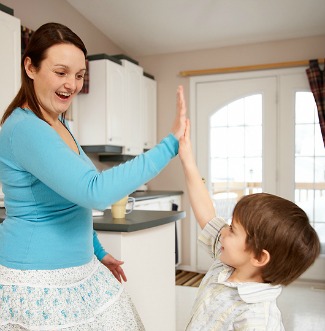As parents, I think we are always concerned about the effects of divorce on children and we debate whether to stay together for the children. Another equally important consideration however is what effect is the marriage having on our children.
My current guest, Fiona McGlynn was about eleven years ago when her parents’ ended their marriage. Even at eleven she had adopted some behaviors to cope with her parents’ relationship and it wasn’t until quite recently that she realized what she’d been doing and why. Here’s Fiona:
My experience of divorce and the impact on me was more to do actually with the time that my parents were together.
 My experience was one in which there was real tension in the house leading up to that time. I remember at the time feeling that was the difficult part: the walking on eggshells, everyone’s upset a lot of the time.
My experience was one in which there was real tension in the house leading up to that time. I remember at the time feeling that was the difficult part: the walking on eggshells, everyone’s upset a lot of the time.
As a child what I internalized was, “Everyone’s upset,” and at the time my way of looking at it was, “If I can be a perfect little girl, then everything’s going to be alright.” That became a fairly dominant personality trait later on in life where I was always out trying to please people. I cared very much about what other people thought and avoided conflict even when a conflict would be a better alternative to many situations.
That was something that went on for a good part of my life or even up until last year. I found myself always making decisions about, “What would look good, what would make people happy? My parents, what do I think they want for me?” I made a lot of decision that were probably not necessarily the ones that would make me the most happy.
I only realized this maybe about a year ago when it became clear to me that a lot of these things that I decided at an early age had somehow stayed with me.
I think I realized it because I reached a point where I was just unhappy enough to start looking at it. I felt a ton of anxiety and was not really sure what to do next. I kept saying, “I’m not happy,” but I felt like, “I have to keep doing what I’m doing. I’ve got to stay on this path.”
What helped me was my boyfriend saying, “Does it really make sense to take this next step in your career when up until now you’ve just been not really content with what you’re doing in life and the decisions you’ve made?”
That was a real wake-up call. That made me quite willing to go back and look at what I’d probably overlooked in the past.
I thought about that and how a lot of other kids are probably doing the same thing. Now, whether they’re deciding, “I want to be perfect” or they’re deciding, “My parents are fighting. They don’t care about me,” or they’re deciding, “My parents are getting divorced. We’re a broken family. I must be broken.” Whatever they decide at a young age that gets carried on.
I think that’s the part to focus on with kids and divorce. How do we make sure that they’ve got the coping skills to recognize what’s going on outside of them and be able to differentiate that from who they are and not making those decisions about who they are because of their parents’ divorce?
The Divorce Coach Says
With our cultural bias towards long-term marriage and the importance of the nuclear family, I think it’s easy to overlook or place lesser weight on the effects your marriage is already having on your children.
I have had interviewees tell me that part of their decision to divorce was based on not wanting their child to think that a marriage should be like theirs, which is getting close but is not quite the same since it’s still more about the spouse-to-spouse relationship and not the effect of that on their child’s own behavior and personality.
I think it may be hard to recognize these effects because it’s hard to detach and be objective. We are all influenced by our upbringing regardless of the quality of our parents’ relationship. Some of it’s good, some of it’s bad, some of it becomes less acceptable because of cultural changes over time. Breaking away from that may also be a normal part of maturing.
I’m not sure that it’s possible to ask your child if certain of their behaviors are because of what’s going on between you and your spouse and for sure, your child may have difficulty connecting their response to your behavior or may not feel comfortable sharing their feelings because of not wanting to take sides or wanting to avoid conflict.
This is where a professional therapist could help you. If you do see behaviors in your child that you are concerned may be unhealthy, you could meet with a therapist and try to gain an understanding of what could be triggering the behaviors and if the difficulties in your marriage could be contributing. It could also help you rule out other possibilities, such as bullying at school.
What effects do you think your marriage is having on your children?
Based on her experience as a child of divorce, Fiona McGlynn has written a beautiful book, i and the Great Divide, aimed at helping children understand that their parents’ divorce is not their fault.